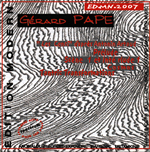|
|
 |
Dusted Reviews
Artist: Gerard Pape Album: Opera/Orchestra/Electronic Music Label: Edition Modern Review date: May. 13, 2003 |

|
|
|
 |
Texture-based Modern Composition
Opera/Orchestra/Electronic Music is, if nothing else, a document of the difficulties of being a modern composer in an era when the classical music establishment doesn’t even care whether or not modern composers exist. Today’s American symphony orchestras rarely program works by living composers, and when they do, they’re usually short and gimmicky. If a piece of modern music doesn’t offer a clear programmatic concept or remnants of the harmonic language of the past, well, forget it.
So Gerard Pape, a Brooklyn-born composer who currently directs a computer music center in Paris, apparently made a couple of huge mistakes when he wrote the two long, weird orchestra pieces on this CD. He wrote “Cosmos” in 1985, then couldn’t get anyone to perform it until 1992, when it was premiered by the Kansas City Civic Orchestra. That premiere, heard here, reveals similarities to the sound-mass textures of György Ligeti as well as the shape-shifting drama of Horatiu Radulescu. Unfortunately, the performance is rather sloppy and the recording sounds distant, which makes Pape’s textures less engaging than they might have been in the hands of better musicians and engineers.
“Act 1, Scene 1” from Pape’s opera Les Cenci unfortunately suffers from many of the same recording troubles. Even more unfortunately, the orchestra is relegated to the background, supporting a singer and two speakers, one of whom seems to be having serious problems with his voice (unless Pape actually planned those voice cracks, in which case the performer is a genius).
It’s easy to imagine that there is great music waiting to be played in Pape’s orchestral scores, however, because the two electronic pieces on Opera/Orchestra/Electronic Tape are superb. In the prelude to Les Censi, Pape builds stuttering, nervous-sounding crescendi from a snippet of what sounds like air being blown through a flute. Pape’s admiration of Iannis Xenakis’ music is evident in “Tantric Transformations,” in which bell-like sounds rustle beneath a drone that’s as dense as much of Xenakis’ electronic music, even if it isn’t quite as disorienting as, for example, Xenakis’ “Bohor.”
Pape’s electronic music demonstrates careful use of texture and tension that would probably translate well to his orchestral work. Unfortunately, he wasn’t able to make the impression here that he’s probably capable of making. An unfortunate Catch-22 of being a composer is that works for a large number of musicians often take longer to write than those written for small groups, but the composer’s extra labor only translates to more person-hours required to perform his or her work. Unless you’re John Adams (read: lame), that problem is worsened by conditions in the American classical music world – the more time you spend writing for more people, the worse the performance you’re going to get. The fact that a composer like Pape can’t get a decent performance of an orchestral piece speaks volumes about how much the classical establishment cares about boundary-pushing new music. Still, Opera/Orchestra/Electronic Music is well worth checking out.
By Charlie Wilmoth
|







